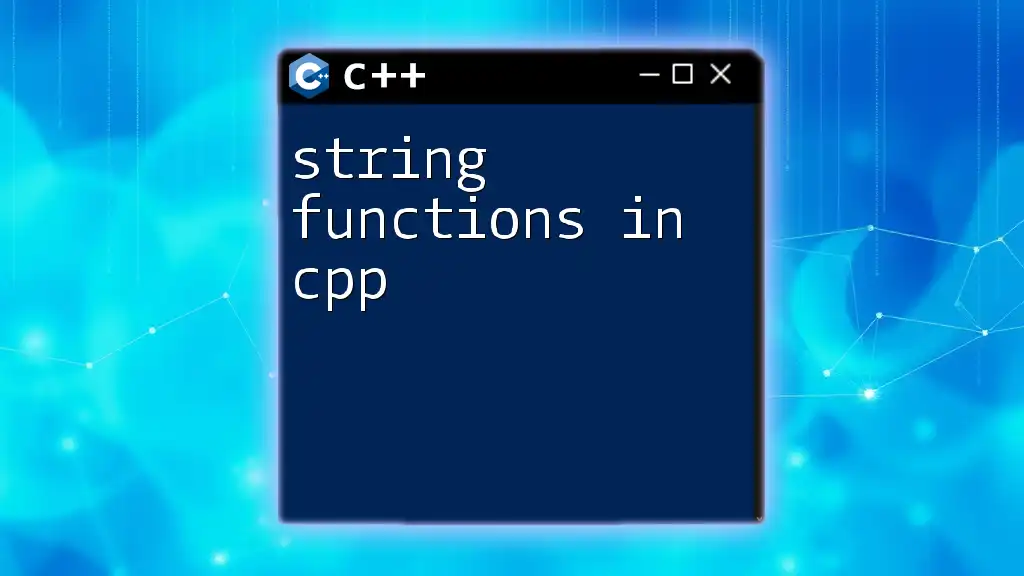In C++, string functions are essential for manipulating and processing string data efficiently, enabling operations such as concatenation, comparison, and substring extraction.
Here's a simple example of using some common string functions:
#include <iostream>
#include <string>
int main() {
std::string str1 = "Hello";
std::string str2 = "World";
// Concatenation
std::string str3 = str1 + " " + str2; // "Hello World"
// Length
std::cout << "Length: " << str3.length() << std::endl; // Output: Length: 11
// Substring
std::string substr = str3.substr(0, 5); // "Hello"
std::cout << "Substring: " << substr << std::endl; // Output: Substring: Hello
return 0;
}
What are String Functions?
String functions in C++ are essential tools that allow developers to manipulate and work with strings efficiently. From accessing characters to modifying the content of strings, these functions play a vital role in text processing. Understanding these functions can significantly improve your coding experience and efficiency.
Overview of C++ String Class
In C++, the String class is a part of the Standard Library, which makes string manipulation much easier compared to C-style strings (character arrays). While C-style strings require manual memory management and functions such as `strcpy()` and `strlen()`, C++ strings provide a more intuitive and safer approach.
Commonly Used String Functions in C++
Accessing String Characters
`at()` and `operator[]`
The `at()` method and the subscript operator (`operator[]`) are used to access individual characters in a string.
Example of `at()`:
std::string str = "Hello";
char ch = str.at(1); // ch will be 'e'
The `at()` method is safer than using `operator[]`, as it throws an exception if the index is out of bounds.
Example of `operator[]`:
char ch = str[1]; // ch will be 'e', but no bounds checking
`.front()` and `.back()`
To get the first and last characters of a string, you can use `.front()` and `.back()`.
Example:
char first = str.front(); // first will be 'H'
char last = str.back(); // last will be 'o'
Modifying Strings
`.append()` Method
The `.append()` method allows you to concatenate a string to the end of another string.
Example:
str.append(", World!"); // str becomes "Hello, World!"
By using `.append()`, you can easily build lengthy strings without worrying about buffer overflows.
`.insert()` Method
With the `.insert()` method, you can insert a substring or character at a specified position in the original string.
Example:
str.insert(5, " Beautiful"); // str becomes "Hello Beautiful, World!"
`.replace()` Method
The `.replace()` method is useful for substituting a portion of a string with another string.
Example:
str.replace(6, 9, "Lovely"); // str becomes "Hello Lovely, World!"
`.erase()` Method
If you need to remove characters, the `.erase()` method provides a simple solution.
Example:
str.erase(5, 7); // str becomes "Hello, World!"
String Utility Functions
Getting String Length
`.length()` and `.size()`
To find out how many characters are in a string, you can use both `.length()` and `.size()`, as they serve the same purpose.
Example:
size_t len = str.length(); // Returns length of the string
Both methods give you the total number of characters, which is crucial for iterating or validating input.
Finding Substrings
`.find()` Method
The `.find()` method is instrumental in locating whether a substring exists within a string and, if so, identifying its starting position.
Example:
size_t position = str.find("World"); // position will be the index of 'W'
`.rfind()` Method
For those times you want to find the last occurrence of a substring, `.rfind()` is your go-to.
Example:
size_t last_pos = str.rfind("o"); // last_pos will be the index of the last 'o'
Substring Extraction
`.substr()` Method
If you want to extract a portion of the string, the `.substr()` method is your best option.
Example:
std::string sub = str.substr(7, 5); // sub becomes "World"
This method allows for greater flexibility in string manipulation.
String Comparison Functions
Comparing Strings
Strings can be compared using `==`, `<`, and other relational operators to determine their lexical order or equality.
Example:
std::string str1 = "Apple";
std::string str2 = "Banana";
bool areEqual = (str1 == str2); // Returns false
This straightforward comparison is key in sorting or filtering arrays of strings.
`.compare()` Method
For more nuanced comparisons, the `.compare()` method delivers detailed results about the string order.
Example:
int result = str1.compare(str2); // Returns negative if str1 < str2
The result will help you understand whether one string precedes another lexicographically.
Advanced String Manipulations
String Formatting
Using `std::stringstream`
The `std::stringstream` class offers powerful formatting capabilities.
Example:
std::stringstream ss;
ss << "The number is: " << 42;
std::string formatted = ss.str(); // "The number is: 42"
This method lets you seamlessly mix strings with other data types.
Converting Between String and Other Types
String to Integer Conversion
With functions like `std::stoi()`, converting a string into an integer becomes seamless.
Example:
std::string number = "123";
int num = std::stoi(number); // num becomes 123
Handling numeric conversions is vital for data validation and processing.
Integer to String Conversion
Similarly, you can convert an integer back to a string using `std::to_string()`.
Example:
int num = 123;
std::string str_num = std::to_string(num); // str_num becomes "123"
Mastering these conversions can significantly simplify data manipulation in applications.
Conclusion
String functions in C++ are not just helpful; they're essential for effective string manipulation. From basic access methods to advanced formatting, understanding how to use these functions allows you to write cleaner and more efficient code.
Further Learning Resources
To deepen your understanding of string functions in C++, consider exploring recommended books, engaging with online courses, or reviewing documentation dedicated to C++ string handling.
Call to Action
We invite you to practice these string functions in your own projects and share your experiences. Your feedback will help us improve future articles and topics!








